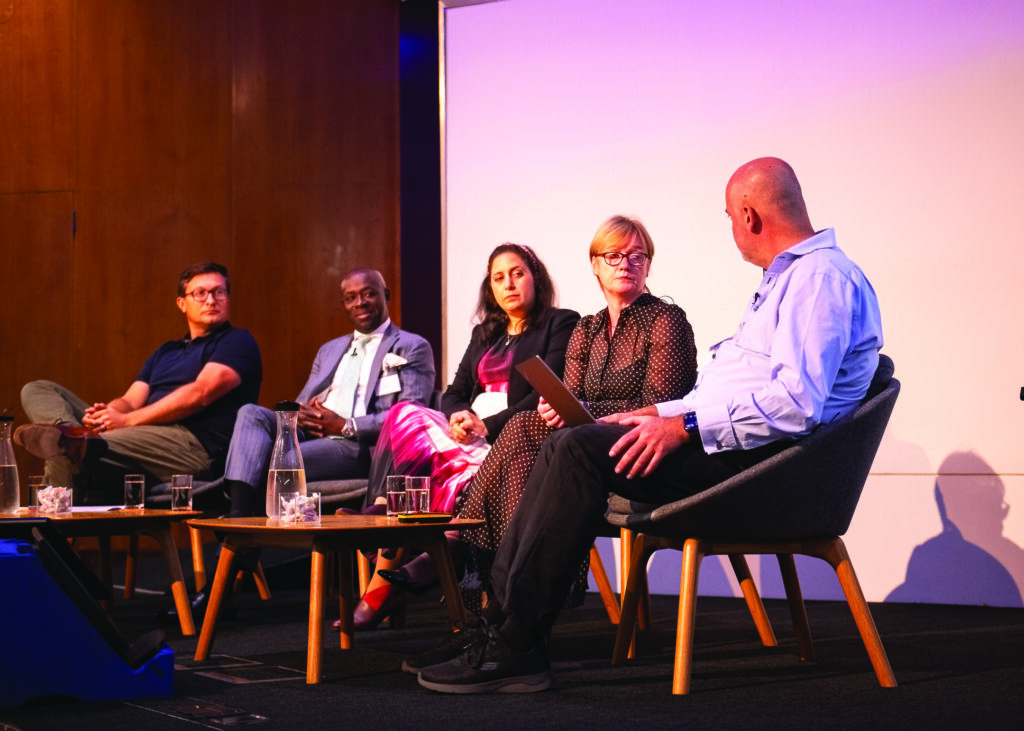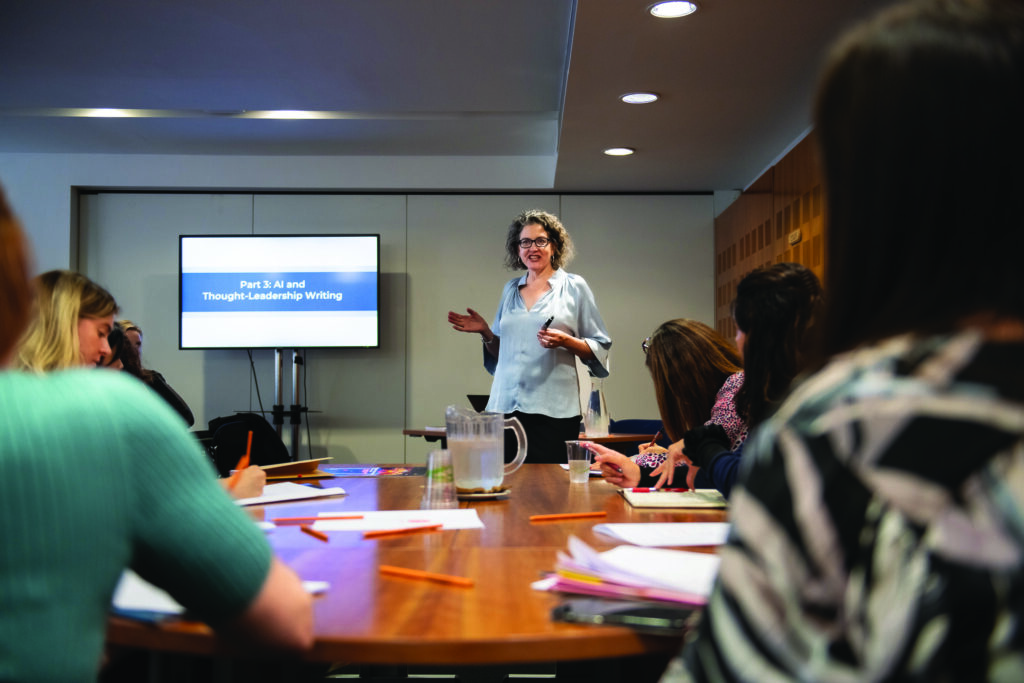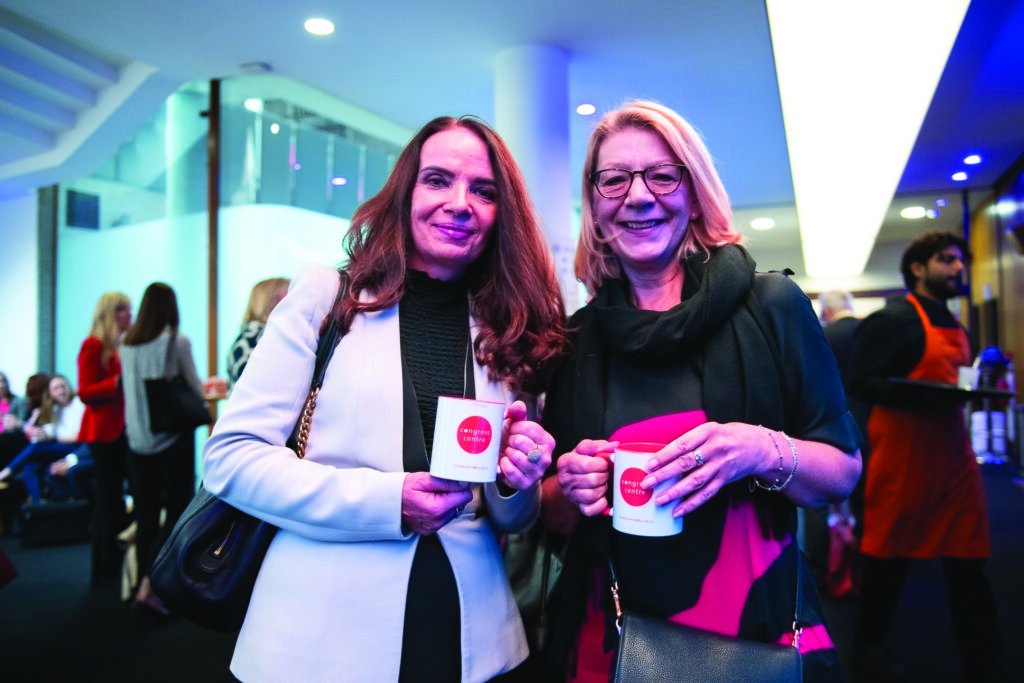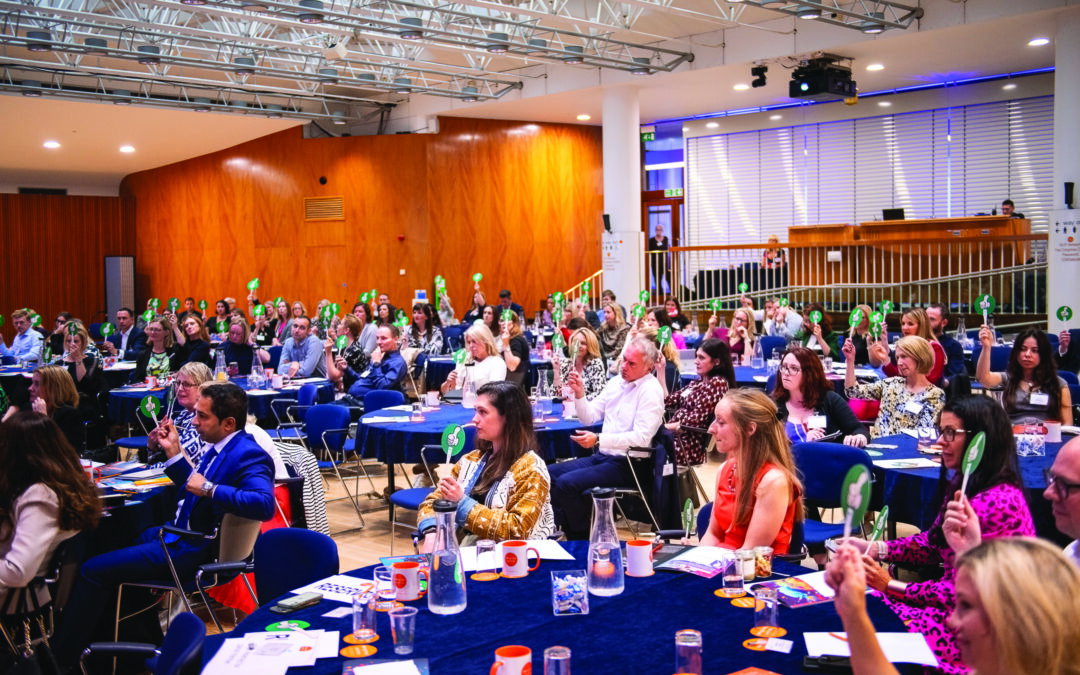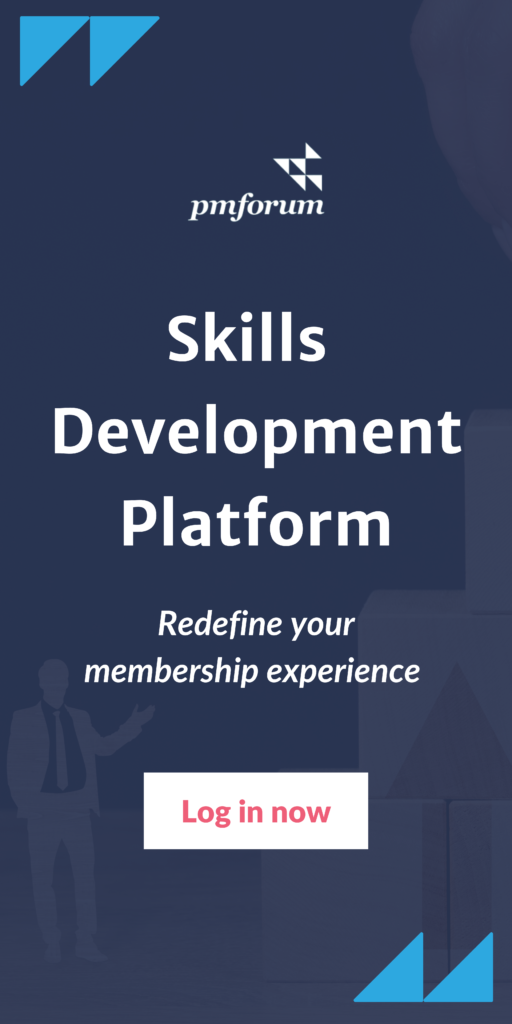 Over 100 marketing and business development professionals gathered in central London for the 28th annual PM Forum conference. Kim Tasso captures the day.
Over 100 marketing and business development professionals gathered in central London for the 28th annual PM Forum conference. Kim Tasso captures the day.
With 100-plus people enjoying coffee in bright orange TUC mugs, the buzz heightened to good vibrations, connecting with familiar faces and new friends, both old hands and the next generation.
Leor Franks, Kingsley Napley, returning chair for the day, led polls using wonderfully low-tech red and green, emperor-style thumbs up and thumbs down paddles. He reminded us of last year’s themes – post-Covid ‘normal’, Ukraine and inflation. ‘Doing more with less’ remains a challenge.
Professor Vlatka Hlupic opened the conference with her keynote on transforming your firm’s culture. The self-effacing Vlatka described the ‘quiet quitting’ disengagement that needs a ‘purpose and people-led’ management revolution to overcome toxic cultures.
She has a rare skill in translating decades of business school insight into powerful, pragmatic tools driving organisational and individual change. She took us on a tour of well-loved art – Munch, Renoir and Van Gogh – conveying the emotional tone at the five levels in her models. Her assessments provide an ‘organisational MRI’.
A star-studded panel followed with Jeremy Ford (Skadden), Francis Mainoo (Moore Kingston Smith), Sally Saadeh (JLL) and Moira Slape (Travers Smith) discussing the biggest challenges facing marketing and business development today:
• How do we own our careers?
• Maximise impact in our firms?
• Keep up with the pace of change? (it was a relief to realise this is a worry for us all)
• Develop external relationships?
Moira’s advice spanned SMART objectives and career plans, to blend the strengths of those around us and not to fear failure. Sally urged us to use mentors who might see things we don’t, move out of comfort zones and be early adopters of AI.
Francis argued for empathy, credibility and trust to hone personal brands and always be on the front foot in external relationships. They all encouraged curiosity, passion, to ‘be like sponges’ and to tune into client needs.
I was alarmed to learn that some don’t find time to read essential reports on new matters and pitch success rates, and that some firms are issuing 70+ items of content a week. Suggestions included a sideways approach to relationship development, avoiding the tsunami of (digital) stuff and sharing initiatives across international boundaries.
Jeremy hit the nail on the head when he observed that marketing teams risk segregation. We are in danger of being as siloed as our fee-earners and rallied for a more ‘holistic marketing’.
Mastering digital distractions
I felt sorry for a delegate who was forced onto her laptop to deal with an urgent enquiry. So it was timely when Stephanie Henson of TechTimeOut shared a quiz and revealed that 69% of lawyers had experienced poor mental health in the past 12 months and 28% were expected to be available 24/7.
To counteract “Tetris-like calendars” she suggested we set boundaries and create healthy habits to avoid the physical, mental and social problems of tech overload. She provided tools to focus on our passions, things that energise and skills we want to learn.
Meaningful Mentoring
Following lunch – little pots of loveliness with the arancini deserving special mention – the conference heard ideas from the forthcoming author of Financial Times Guide to Mentoring and relationship strategist, Andy Lopata.
Polls revealed the majority had received mentoring but not so many had provided it (a timely reminder of the PM Forum’s Mentor Match programme).
He tackled the confusion between mentoring and coaching and was evangelical about social learning and paying it forward. With five generations in the workplace, there was a greater need for reverse mentoring.
Are professional services firms truly listening to client needs?
The conference closed with an engaging panel discussion. Francesca Lagerberg, CEO of Baker Tilly, chaired a discussion with Kate Cooper, Director of Finance at the Institute of Directors, and Alain Thys.
As marketers, we must remain tuned into the client voice and this panel provided plenty of food for thought. There were observations about commoditisation and the need to ‘provide proper answers to tricky questions’. Both parties must understand each other’s context and organisational culture rather than ‘sell, sell, sell’.
A good client experience is where advisers listen to and provide direct and tailored advice.
There was support for a dedicated relationship manager as teams of specialists expand and staff churn continues.
Alain provided the quote of the conference with “Walk in stupid” – never make assumptions, constantly ask questions and triple-check that you have understood.
Leor rounded off the conference with his final summary: culture, challenges for marketing and client listening. And a reminder of the stark reality of the ‘dangers of digital’.
Richard Chaplin, CEO of PM Forum, thanked his team (Sam Davies, Claire Mitchell, Larysa Hale and Morag Campbell) and announced next year’s conference date – 26th September. He repeated his appreciation of the conference sponsors – Vuture, TechTimeOut, Chorus and Bright Space – and we gratefully moved on to the drinks reception.
Whilst our feeds are dominated by AI, the conference highlighted the critical importance of human warmth, collaboration and wisdom.
The breakout workshops
Business case for net zero
John Rastrick, Flotilla, talked persuasively about the need for data-led, impactful climate action. The climate clock is ticking and presents opportunities for competitive differentiation.
Preparing professionals for the future
I co-presented with Julie McConnell from White and Case, brainstorming ways to promote effective and continuous learning. Julie’s story – from a career as a construction lawyer to leading a variety of marketing programmes – kept us all entranced and made us envious of a global firm’s resources.
Thought leadership
Veteran professional services PR guru Tim Prizeman joined Rhea Wessel from The Thought Leadership Institute. “Rhea and Tim chaired a dynamic session and usefully focused on practical tips to ensure our marcoms stand out,” said one delegate, with Navjote Chan at Burges Salmon, adding “the three steps – ‘Find it, Frame it, Flesh it out’ to improve journalistic delivery”.
Walking in the client’s shoes
Ben Sutton of Grant Thornton and Alain Thys took delegates on the client journey of the future. To future-proof client relationships using clarity, empathy, commitment and flair.
Using data to grow revenue and improve client experience
Tech duo Mark Bilson of ClientRMand David Bennett of Birkett Long considered how cloud-based technology transformed the problematic area of data management.
Leveraging the ‘S’ in ESG
An additional option was hosted by David Johnson, Lamp House Strategy, and Caroline Rhys Jones of Stephenson Harwood. Delegates heard stakeholder research on how to maximise ROI in social strategies.
“Discussion revealed that clients are most concerned with the wellbeing of people and their social contribution,” reflects Sam Round of Hazlewoods Accountants. “ESG targets and work is under-communicated and clients will be increasingly interested in purpose versus profit.”
